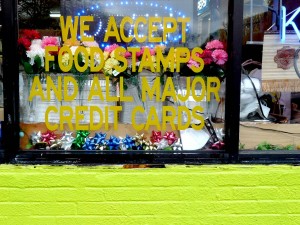
https://vimeo.com/18393244]
The Alaqsa Halal Meats and Groceries on Wyoming Avenue is a desolate place as the month winds down. Husam Abdullah, the owner, awaits the new month with apprehension because with it comes a replenishment of food stamps for his customers.

“Fifty percent of the business is dependent on the food stamps,” Abdullah said. “Otherwise, it will go out of business.”
Abdullah’s sentiments are echoed by all the other small food markets in Feltonville. If the owners did not accept food stamps, they would not be able to survive. Store owners reported that 50 percent to as high as 90 percent of customers buy their products with food stamps.
The program is called the Supplemental Nutrition Program and provides low-income families with a card they can use at grocery stores and supermarkets. The card contains a specific amount of money allocated to the household to use for food or seeds.
In Philadelphia, the latest count for people using food stamps is 327,903 and the average allotment per month is $263.
The Food Research and Action Center (FRAC) found that 93 percent of eligible Philadelphians claim their food stamp benefits, which is the highest percentage for a city in the United States.
Feltonville is located in the 1st Congressional District of Philadelphia. This district is the second highest congressional district in the nation with people who use good stamps, according to a FRAC report released in January 2010. The report found that 36 percent of respondents in this district said that in the past 12 months they have not had the money to buy food that they or their family needed.
Gail Postell, a Feltonville resident, uses food stamps, but still she has problems buying the food she needs.
“Everything is so high. You go to the store with $20 and you come out with four things,” Postell said.
Even with her food stamps, Postell often has to put her own money toward groceries.
Abdallah has seen customers come into his store who are unable to buy milk and bread for their children. Many times he has given away food to these customers to make sure that they eat.
“I work with the people in this neighborhood,” Abdullah said.

Sultan Aldababseh, the owner of Sultan Food Market, has experienced similar situations in his store. People come in and are unable to pay for simple things like fruit or bread.
“Sometimes customers don’t have enough money and I say don’t worry about it,” Aldababseh said.
Aldababseh said that the biggest difference is that people spend much less money in his store than in previous years. People used to buy multiple items in his store, but now most of his customers just buy sodas, candy or chips.
“It’s the same customers, but one or two years ago, a customer spent $15 or $20, now $2 or $3,” Aldababseh said. “No one has money.”
Abdallah was shocked when someone came into his store and ordered a quarter pound of ground beef.
“I had never seen that before,” Abdallah said. “People are more careful about what they get.”
Abdallah said that most people just get the essentials and nothing more. “In the past, I guess they were treating themselves,” Abdallah said.

Pranat Amin has owned the American Food Market for 20 years. It is situated between Sultan’s and Alagsa Halal Meats and Groceries. Amin has experienced many of the same problems. He allows his customers to use credit for their groceries so they can pay when they can. Customers come in with groceries and sign their names and their purchases in a book he keeps behind his register.
Amin’s store is also a Women Infants, Children (WIC) authorized store. The WIC program supplies pregnant, breastfeeding and postpartum women, babies and young children with nutritious foods. The approved foods are specific and include items such as milk, cheese, eggs, peanut butter, formula, cereal, 100 percent juices and dried beans. The approved foods are listed on a check that is given to the store owner.
“I’d say 70 percent of people use food stamps and that includes WIC easily,” Amin said.
The American Food Market has been robbed six times, all in the past three years. Although these robberies have occurred in the recent economy, Amin attributes them to the area.
“This area is bad. People just want easy money,” Amin said.
Amin plans to sell his business, but he is having problems finding buyers.
The competition is pretty heavy on Wyoming Avenue since there are almost 10 food markets on just that street. The owners have to make sure they offer something different to make money.
Abdallah’s store has a huge international section as well as high-quality meats. He receives the meat directly from the slaughterhouse, so it is always fresh. They sell Halal meats, which is a type of kosher foods.
Amin uses the WIC program to get more customers. He has also been in the area for 20 years and knows most of the customers.
Aldababseh at Sultan’s Food Market is trying to target his Spanish customers by offering more Goya products. He added a produce section when he saw a need for it and took away the dining area when he saw it was losing money.
“I’m going to try my best to change-change-change to keep my business open,” Aldababseh said. “Step by step, I hope the business stays.”
[swfobject]https://smcsites.com/soundslides/uploads/sp1022feltonvillefoodstamps/sp1022feltonvillefoodstamps.swf, 550, 700[/swfobject]


Excellent web page , I have found this insightful. Loads of helpful tips from it. I’m really interested in the results on unhealthy weight. Maybe you have tried taking lipobind intended for saving fat ingestion? Or, do check it out for. It’s effective to me. I’ve left a url to. Thanks.